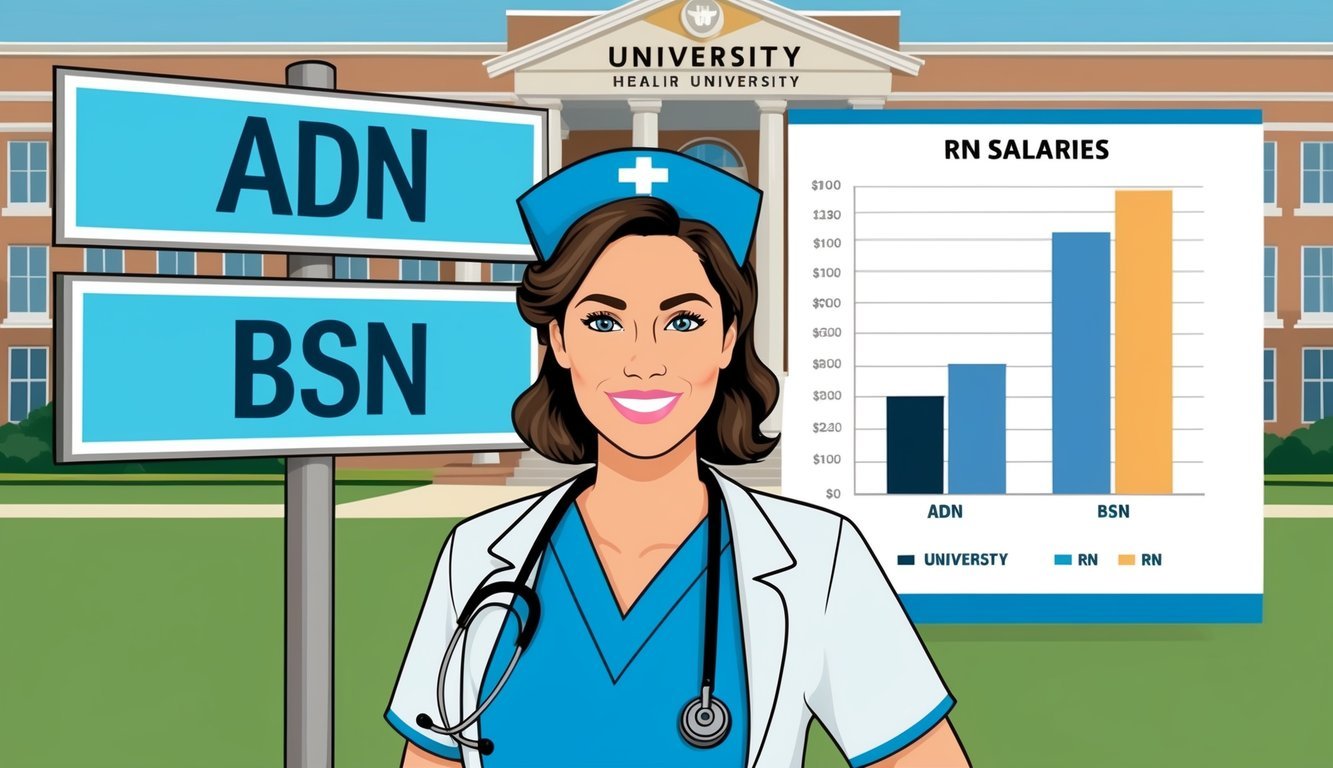As you explore the world of nursing, you need to understand the financial aspects of your career.
A registered nurse with an Associate Degree in Nursing (ADN) can expect to earn a competitive salary that reflects their skills and dedication. The average salary for ADN RNs is around $77,000 annually, with variations based on experience, specialization, and geographical location.
Being informed about salary potential is essential for making educated career choices.
Factors such as the setting in which you work and additional certifications can significantly impact your earnings.
Exploring opportunities in high-demand areas can lead to better compensation, as nursing continues to grow rapidly.
In this blog post, you will gain insights into the factors affecting ADN RN salaries, including comparisons to other nursing degrees and tips for maximizing your earning potential.
Understanding these elements will help you navigate your nursing career with confidence and foresight.
Understanding ADN and BSN Degrees

When considering a nursing career, understanding the differences between an Associate Degree in Nursing (ADN) and a Bachelor of Science in Nursing (BSN) is essential.
Each path has unique features that can impact your education length, costs, and career opportunities.
Differences Between ADN and BSN Programs
The ADN program typically spans two years and is often offered at community colleges.
This path focuses on the essential clinical skills needed for entry-level nursing positions.
In contrast, the BSN program can take four years and covers broader topics, including leadership, public health, and research.
Graduates from a BSN program often have better job prospects and may qualify for advanced roles due to their additional training.
Many employers prefer or require BSN-prepared nurses for certain positions to meet the increasing complexity of healthcare demands.
Tuition Costs and Program Length
Tuition for ADN programs generally ranges from $10,000 to $30,000, depending on the institution.
Community colleges typically offer lower costs, making ADN more accessible.
Conversely, BSN programs can range from $25,000 to $60,000 at universities.
In terms of program length, an ADN takes about two years, while a BSN requires four years of study.
Some institutions also offer RN-to-BSN programs that allow registered nurses with an ADN to earn their BSN in a shorter time frame, often through online courses.
These programs are designed for convenience, accommodating working professionals.
Registered Nurse Salary Overview

Registered nurses (RNs) play a vital role in the healthcare system, and their salaries can vary based on multiple factors.
This section explores the average RN salary and the key elements that influence your earning potential.
Average RN Salary
As of recent data, the median annual salary for registered nurses is approximately $86,070 according to the U.S. Bureau of Labor Statistics.
The hourly rate averages around $41.40.
| Salary Percentile | Annual Salary | Hourly Wage |
|---|---|---|
| Lowest 10% | $63,720 | $30.63 |
| Median | $86,070 | $41.40 |
| Highest 10% | $132,680 | $63.75 |
If you hold an Associate Degree in Nursing (ADN), your average salary may be slightly lower.
Reports suggest average annual earnings of around $77,001 for ADN nurses, equating to about $37 per hour.
Overtime pay can also enhance your total earnings, particularly in high-demand healthcare settings.
Factors Influencing RN Salary
Multiple factors impact your salary as a registered nurse.
Years of experience are significant; experienced nurses tend to earn more, with starting salaries below the median increasing substantially with tenure.
Your specific healthcare setting also plays a role.
RNs in hospitals often earn higher salaries than those in outpatient care facilities.
Additionally, geographic location affects pay rates significantly; states like California and Massachusetts usually offer higher salaries compared to others.
Other influences include the level of education.
A Bachelor of Science in Nursing (BSN) may command a higher salary than an ADN.
Specializations in high-demand areas or advanced certifications can also lead to increased earning potential.
Career Outlook for Nursing

The nursing field presents a range of employment settings and a unique environment influenced by current healthcare trends.
Understanding where opportunities exist and the implications of the nursing shortage will help you navigate your career path effectively.
Employment Settings and Opportunities
As an RN with an Associate Degree in Nursing (ADN), you have access to various employment settings.
Major options include:
- General Medical and Surgical Hospitals: The largest employers of nurses. You can expect a dynamic environment with a high patient turnover.
- Outpatient Care Centers: These facilities offer scheduled services, allowing for more predictable hours.
- Nursing Care Facilities: Work in long-term care settings, focusing on rehabilitation and chronic illness management.
Many healthcare employers, including private practices and community health organizations, are also expanding their nursing teams.
The flexibility in roles means you can find positions that align with your interests and career goals.
The Impact of the Nursing Shortage
The nursing shortage is a significant factor affecting the healthcare landscape.
Several elements contribute to this shortfall:
- Increased demand for healthcare services due to an aging population.
- A high turnover rate among nursing staff, often due to burnout.
As a result, hospitals and other healthcare facilities are actively seeking qualified RNs.
This demand can lead to more job opportunities, potentially higher salaries, and benefits to attract talent.
According to the Bureau of Labor Statistics, registered nursing positions are expected to grow significantly, highlighting the need for your skills.
You can explore more about this in the U.S. Bureau of Labor Statistics.
Advancements in Nursing Careers
Nursing offers numerous pathways for career growth, especially for those holding an Associate Degree in Nursing (ADN).
By pursuing additional education, nurses can unlock opportunities in specialized fields and advanced roles that enhance their professional scope and earning potential.
BSN-Prepared Nurse Opportunities
Transitioning to a Bachelor of Science in Nursing (BSN) can significantly expand your career options. BSN-prepared nurses are often preferred by employers for leadership roles and specialized areas.
Many hospitals and healthcare organizations are starting to adopt the “BSN in Ten” initiative, which encourages RNs to obtain a BSN within ten years of getting their ADN.
A BSN also allows you to pursue roles in administration, education, and public health.
Many organizations offer incentives such as tuition reimbursement for nurses continuing their education.
Engaging in RN-to-BSN programs can be an effective way to advance your qualifications while maintaining your current job.
Transitioning from ADN to BSN
The transition from an ADN to a BSN is streamlined in many programs. RN-to-BSN programs generally emphasize clinical skills and leadership training, enhancing your competencies in patient care.
These programs often permit you to complete your degree online or part-time, making it manageable alongside your work commitments.
The coursework not only covers advanced clinical topics but also includes community health and nursing research, often culminating in a capstone project that allows you to apply your learning in a practical setting.
Advanced Nursing Specializations
Obtaining an advanced degree opens the door to specialized roles as an Advanced Practice Registered Nurse (APRN).
Depending on your interests, you can pursue further education in fields like nurse practitioner, clinical nurse specialist, nurse anesthetist, or nurse midwife.
In pursuing these specializations, you will gain deeper knowledge and skills related to specific patient populations or healthcare settings.
Many advanced roles also come with higher salaries and increased job satisfaction due to the complexity and impact of your work.
A focus on nursing specialties can enhance your employability and provide professional fulfillment as you work in areas that align with your passions.
Licensing and Certification

To become a licensed Registered Nurse (RN) with an Associate Degree in Nursing (ADN), you must meet specific requirements.
These include passing the NCLEX-RN exam, ongoing education, and considerations of union membership.
Understanding these components is essential for advancing your nursing career.
NCLEX-RN Exam Requirements
The NCLEX-RN exam is a mandatory step for ADN graduates aiming to become licensed RNs.
This exam assesses your nursing knowledge and skills to ensure you are competent to provide safe and effective care.
Key points:
- Eligibility: To sit for the NCLEX-RN, you must have completed an accredited nursing program, such as an ADN or BSN.
- Application Process: You need to submit an application to your state’s nursing board and pay the associated fees.
- Exam Structure: The NCLEX-RN is a computer-adaptive test, meaning it adjusts the difficulty based on your responses.
Preparation is crucial.
Many candidates use review courses or study resources to enhance their chances of success.
For more information, visit the National Council of State Boards of Nursing.
Continuing Education and Union Membership
After obtaining your license, you need to complete continuing education to maintain it.
Most states require continuing education for license renewal every few years, ensuring you stay updated on practice standards.
Considerations include:
- Coursework: Educational opportunities can include workshops, conferences, or online courses relevant to your practice area.
- Union Membership: Joining a nursing union can provide resources for continuing education, advocacy, and support in negotiations.
Being part of a union may offer benefits like access to job boards and professional development resources, which can enhance your career prospects as an RN.
For more insights, check the American Nurses Association.

